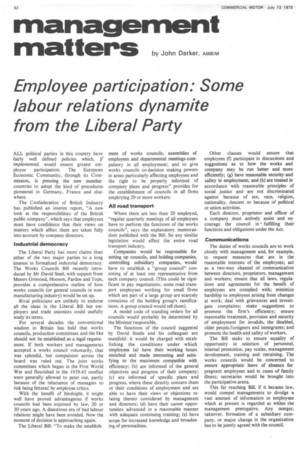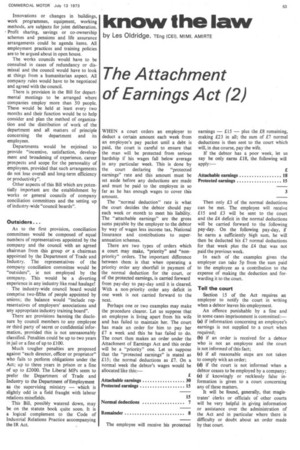management
Page 54

Page 55

If you've noticed an error in this article please click here to report it so we can fix it.
matters by John Darker, AMB M
Employee participation: Some labour relations dynamite from the Liberal Party
ALL political parties in this country have fairly well defined policies which, if implemented, would ensure greater employee participation. The European Economic Community, through its Commission, is pressing the new member countries to adopt the kind of procedures pioneered in Germany, France and elsewhere.
The Confederation of British Industry has published an interim report, "A new look at the responsibilities of the British public company", which says that employees must have confidence that their views on matters which affect them are taken fully into account by company directors.
Industrial democracy
The Liberal Party has more claims than either of the two major parties to a long interest in formalized industrial democracy. The Works Councils Bill recently introduced by Mr David Steel, with support from Messrs Grimond, Hooson, Pardoe and Tope, provides a comprehensive outline of how works councils (or general councils in nonmanufacturing industry) would be set up.
Rival politicians are unlikely to endorse all the ideas in the Liberal Bill but employers and trade unionists could usefully study its terms.
For several decades the conventional wisdom in Britain has held that works councils, production committees and the like should not be established as a legal requirement. If both workers and managements accepted a works council voluntarily, that was splendid, but compulsion across the board was ruled out. The joint works committees which began in the First World War and flourished in the 1939-45 conflict were generally allowed to peter out, partly because of the reluctance of managers to risk being fettered by employee critics.
With the benefit of hindsight, it might well have proved advantageous if works councils had been enjoined by law, 20 or 30 years ago. A disastrous era of bad labour relations might have been avoided. Now the moment of decision is approaching again.
The Liberal Bill: "To make the establish
ment of works councils, assemblies of employees and departmental meetings compulsory in all employment; and to give works councils co-decision making powers in areas particularly affecting employees and the right to be properly informed of company plans and progress" provides for the establishment of councils in all firms employing 20 or more workers.
All road transport
Where there are less than 20 employed, "regular quarterly meetings of all employees have to perform the functions of the works councils", says the explanatory memorandum published with the Bill. So any similar legislation would affect the entire road transport industry.
Companies would be responsible for setting up councils, and holding companies, controlling subsidiary companies, would have to establish a "group council" consisting Of at least one representative from each company council. (This could be significant in pay negotiations; some road transport employees working for small firms which are part of a large group are scarcely conscious of the holding group's ramifications. A group council would tell them).
A model code of standing orders for all councils would probably be determined by the Minister-responsible.
The functions of the council suggested by David Steele and his colleagues are manifold: it would be charged with establishing the conditions under which employees (a) have their working hours enriched and made interesting and satisfying to the maximum compatible with efficiency; (b) are informed of the general objectives and progress of their company; (c) are informed of specific plans and progress, where these directly concern them or their conditions of employment and are able to have their views or objections relating thereto considered by management and directors; (d) have their career opportunities advanced in a reasonable manner with adequate continuing training; (e) have scope for increased knowledge and broadening of personalities. Other clauses would ensure that employees (0 participate in discussions and suggestions as to how the works and company may be run better and more efficiently; (g) have reasonable security and safety in employment; and (h) are treated in accordance with reasonable principles of social justice and are not discriminated against because of sex, race, religion, nationality, descent or because of political or union activities.
Each director, proprietor and officer of a company must actively assist and encourage the council in fulfilling their functions and obligations under the Act.
Communications
The duties of works councils are to work closely with management and, for example, to request measures that are in the reasonable interests of the employees; act as a two-way channel of communication between directors, proprietors, management and workers; ensure that all laws, regulations and agreements for the benefit of employees are complied with; minimize hardship to employees arising from changes at work; deal with grievances and investigate complaints; make suggestions to promote the firm's efficiency; ensure reasonable treatment, provision and security of employment for invalids, the disabled, older people,foreigners and immigrants; and promote the health and safety of workers.
The Bill seeks to ensure equality of opportunity in selection of personnel, internal promotion, pay scales, management development, training and retraining. The works councils would be concerned to ensure appropriate leave of absence for pregnant employees and in cases of family illness; secretaries would be brought into the participative arena.
This far reaching Bill, if it became law, would compel managements to divulge a vast amount of information to employees which at present is regarded as within the management prerogative. Any merger, takeover, formation of a subsidiary company, or major change in the organization has to be jointly agreed with the council. Innovations or changes in buildings, work programmes, equipment, working methods, are subjects for joint deliberation. Profit sharing, savings or co-ownership schemes and pensions and life assurance arrangements could be agenda items. All employment practices and training policies are to be argued about in open house.
The works councils would have to be consulted in cases of redundancy or dismissal and the council would have to look at things from a humanitarian aspect. All company rules would have to be negotiated and agreed with the council.
There is provision in the Bill for departmental meetings to be arranged where companies employ more than 50 people. These would be held at least every two months and their function would be to help consider and plan the method of organization and the distribution of work of the department and all matters of principle concerning the department and its employees.
Departments would be enjoined to provide "incentive, satisfaction, development and broadening of experience, career prospects and scope for the personality of employees, provided that such arrangements do not lose overall and long-term efficiency or productivity".
Other aspects of this Bill which are potentially important are the establishment by works or general councils of company conciliation committees and the setting up of industry-wide "council boards".
Outsiders ...
As to the first provision, conciliation committees would be composed of equal numbers of representatives appointed by the company and the council with an agreed chairman from this group or a chairman appointed by the Department of Trade and Industry. The representatives of the company conciliation committee would be "outsiders", ie not employed by the company. This would be a diverting experience in any industry like road haulage!
The industry-wide council board would comprise two-fifths of people appointed by unions; the balance would "include representatives of employers' associations and any appropriate industry training board".
There are provisions banning the disclosure by council members to any employee or third party of secret or confidential information, provided this is not unreasonably classified. Penalties could be up to two years in jail or a fine of up to £100.
Much tougher penalties are proposed against "each director, officer or proprietor" who fails to perform obligations under the Act; up to three years in prison or a fine of up to £2000. The Liberal MPs seem to prefer the Department of Trade and Industry to the Department of Employment as the supervising ministry — which is slightly odd in a field fraught with labour relations minefields.
This Bill, possibly watered down, may be on the statute book quite soon. It is a logical complement to the Code of Industrial Relations Practice accompanying the IR Act.
































































































